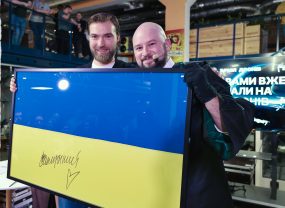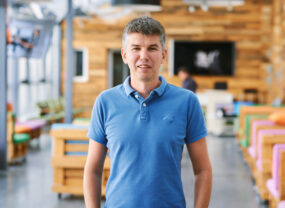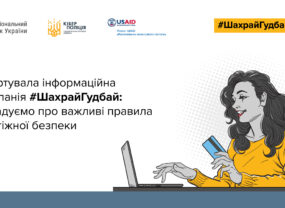Source: Nv.ua.
Mykola Paliienko, CEO and co-founder of EVO, a graduate of the program School of Strategic Architect at the Kyiv-Mohyla Business School, described how his company not only manages to stay afloat during the quarantine, but also to launch new products and keep the business profitable.
EVO is a Ukrainian product IT company. Its projects are the largest marketplaces for online shopping — Prom.ua, Bigl.ua, Kabanchik.ua, IZI.ua, Crafta.ua, Shafa.ua, Vchasno — an electronic document management service, Zakupki.Prom.ua — a platform for public and commercial auctions. It helps entrepreneurs to grow their business and make online shopping easier. Every second online buyer in Ukraine buys something on their platforms.

— First, we agreed to discuss the transformations taking place in EVO over the last three years, and then the virus, the quarantine, the beginning of a new global crisis and, as I understand it, the beginning of new unexpected transformations. Tell us what is changing today in e-commerce, in the consumption of goods and services?
— E-commerce has already changed twice during this time. As soon as restrictive measures were introduced, the demand for sanitizers, masks, buffs, respirators and cereals increased dramatically on the marketplaces as people tried to stock up ahead.
This lasted, literally, a week and a half or two weeks, and then everyone started to go back to their normal life, with adjustments for the situation, of course. There is less buying of clothes and everything that could be put off for later. The demand for fitness equipment, goods for the garden has resumed. Sales of goods for creativity have increased significantly: paintings by numbers, educational games, building sets. The demand for food has remained unchanged.
Today, it is difficult to say how the situation will develop further — no one understands what will happen to the purchasing power of our citizens. Will people be able to keep their business or job, or will people have money for anything other than food?
— Marketplaces and trading platforms are your business. How does the situation in the country affect your company as a whole and individual projects as Zakupki.Prom.ua, Vchasno and others?
— E-commerce is doing well in general — it is one of the stable sales channels during the crisis in the world. We observe the reaction of operators in China, the United States and other countries, we take their experience.
Most of our projects are showing little growth. The Internet is one of the few tools available to buy not only food but also something else. For instance, to order a delivery of groceries, cleaning or master services. People need to cover their needs and they do it online.
The number of documents that companies sign online via the “Vchasno” service has also doubled. It is only a matter of few hours to switch to electronic document management, it is convenient and legal, but old patterns often prevent businesses from using modern opportunities. Quarantine invigorates the process as businesses move their accounting work to a remote mode under the influence of events.
Today, even some of the government agencies are moving to a remote working mode, which has caused a little chaos, because they are not used to such a mode. But they quickly learn to work. The simplification of certain purchases, including pandemic goods, is helping them. Now it is easier for the state to buy all kinds of protective equipment for doctors and hospitals, including from the Prozorro Market through the Zakupki.Prom.ua platform.
We are also waiting for an increase in the number of transparent tenders. Since mid-April, public procurements in excess of UAH 50,000 will be made through the Prozorro system involving electronic platforms (the purchases from UAH 200,000 and more were mandatory for the system until April 19 – editor’s note).

— What new challenges do you think await your industry, what have you prepared for, and what could become a kind of black swan? How quickly and flexibly can your organization transform itself if necessary?
— In most cases, we do not change anything drastically, we only adjust to the situation. The system is adaptive. In conditions of dynamic demand, we respond to challenges and shift our focus accordingly.
With the start of the quarantine, the demand for delivery has increased dramatically, post offices and couriers can barely keep up with the loading. We wanted to help. We do not have our own couriers, but our ecosystem has “Kabanchik” — an online service for ordering services. Here people find specialists for any task they need to do — to fix, to repair, to deliver. Tens of thousands of people ready to run courier errands are registered here. We made a separate application in a week called Kabanchik Delivery to help people get faster and more convenient shopping from stores, medicines from pharmacies, or whatever.
We saw the problem of an acute shortage of masks, respirators, antiseptics, gloves — hospitals cannot quickly find quality products at an adequate price. Therefore, we created an open online database of importers and manufacturers of medical equipment on the website Zakupki.Prom.ua. So that hospitals did not waste time on senseless searches and bought what they needed at market prices directly.
Due to the increased demand for food, we launched Prom-gastromon — a separate section with food products on the marketplace, including those from grocery supermarkets with day-to-day delivery.
Several other solutions are under development. They are produced by joint teams of different projects. It is important to be flexible: to reallocate resources when it’s urgently needed. But it’s just as important to keep doing what’s needed.
— Three years ago you studied at the School of Strategic Architect at kmbs. Do you use an ecosystem approach in business?
— Our projects are basically an ecosystem. We unite suppliers of any goods and services with buyers and customers through platforms and related services. We create an environment where they are comfortable, safe and profitable. At the same time, we act as a mediator, a kind of connector who builds trust between the participants, helps to implement agreements and facilitates them when necessary. And, in fact, this allows hundreds of thousands of orders a day to be processed at our platforms. We do not perform any shipments ourselves. It is done by those sellers and suppliers who have entered our system and work according to our rules.
All services actually live within our EVO ecosystem and interact with each other. We have more than 10 projects, each with its own manager and team, but there are services common to all of them including HR, internal IT, office space etc.
— Were you sure that the transformation process would not affect the business?
— We were convinced that we want to make something bigger from the monocompany Prom.ua was 5 years ago. We have been trying to create a number of similar products all connected to each other. And there was a risk we would do unnecessary things. We have been experimenting and learning.
In most cases, we do not change anything drastically, we only adjust to the situation. The system is adaptive. In conditions of dynamic demand, we respond to challenges and shift our focus accordingly.
For instance, at the beginning we had several projects and a lot of common resources including development, marketing. Later, they began to compete for these resources, there were conflicts as to which one needed more. As a result, the projects started pulling resources from the shared ecosystem to themselves. And, subsequently, everything that was required for development and smooth operation went inside the businesses.
All functions necessary for the efficiency of service operations remain common.
— Any transformation is a result of one of three factors: a response to internal changes and challenges, external stimuli and threats, or the third — a hybrid mixture of the two. What was the case with your company?
— In our case, it’s a hybrid system. I would not say that we live in any particular state of transformation, because we are, in fact, evolving and constantly changing and growing.
Growth implies changes, adaptation to the realities and demands of the market. Now we see that the market is changing and we need to adjust. Although, not the way we imagined it at the end of 2019 during our strategy sessions. All of our plans are being adjusted right now. I think this is currently happening in all companies.
— What is the most difficult thing to adjust to during this most difficult process?
— Overcoming inertia is the hardest. When you change something, you usually have a stable system that resists in every way. It takes a lot of effort to deal with it. But when a new process is on, that same inertia helps you keep the momentum going and keep the speed up.
— How can you effectively manage change when transitioning to a new business model and even in the time of crisis?
— What’s needed most is flexibility. It is very important to adapt, work with a team, try to retain key specialists and resources. It is also important to see new business opportunities and launch new solutions. And when it’s all over, and it definitely will be over someday, you’ll be stronger and get more new opportunities than those who have waited it out.








